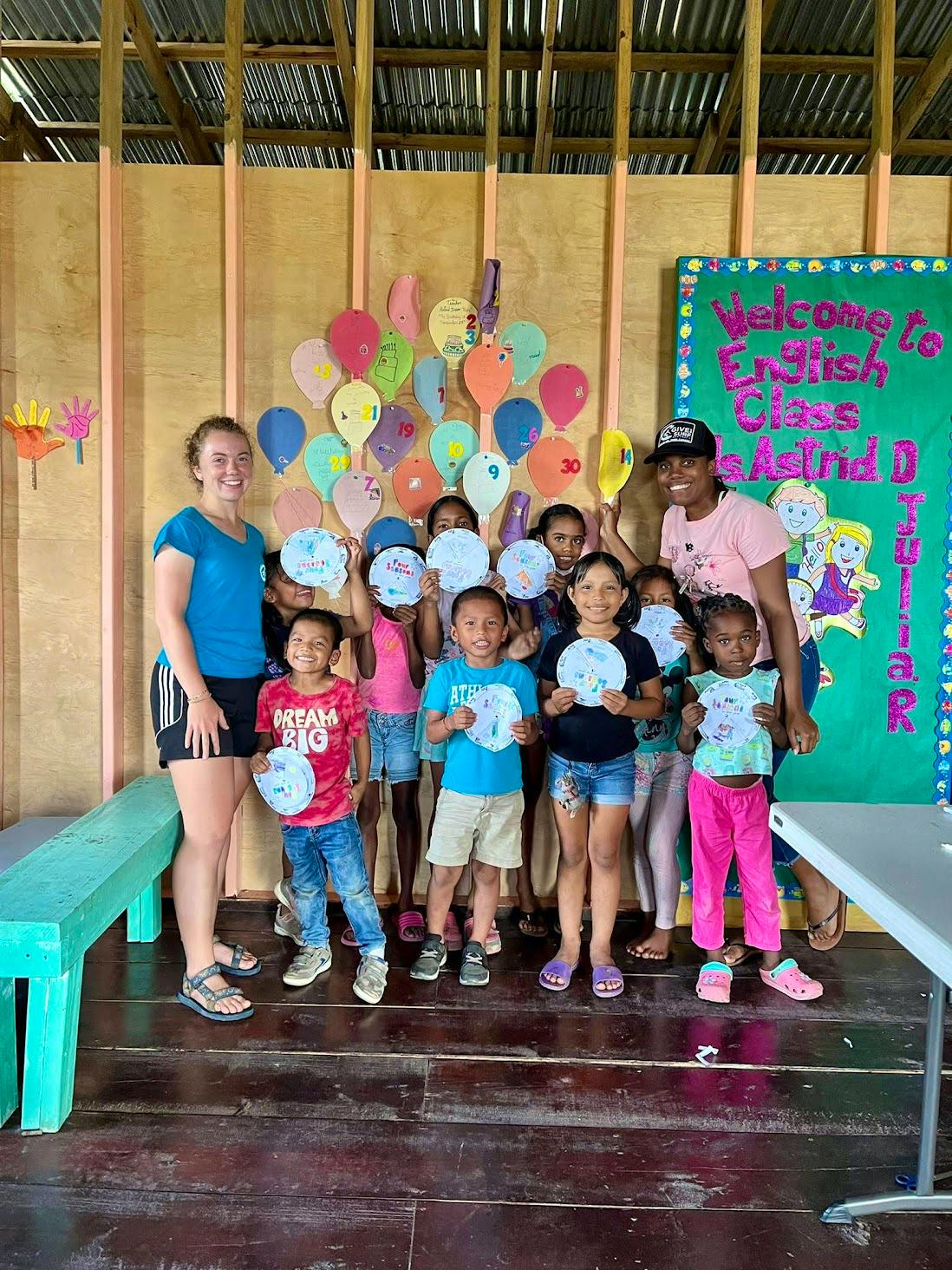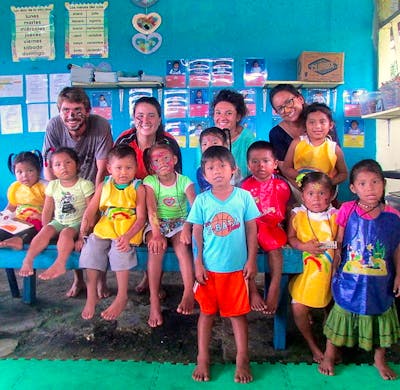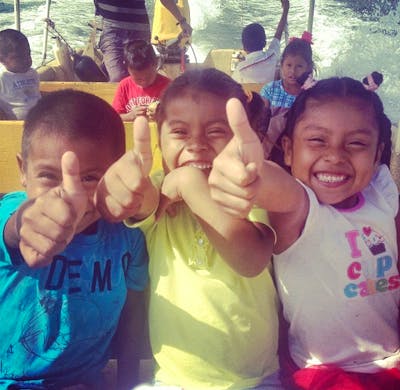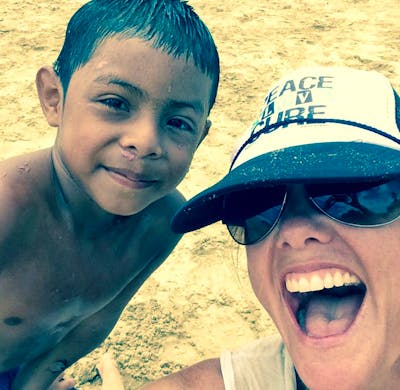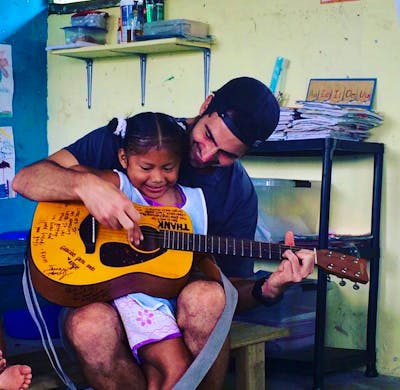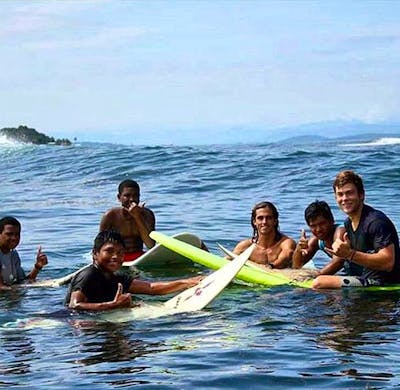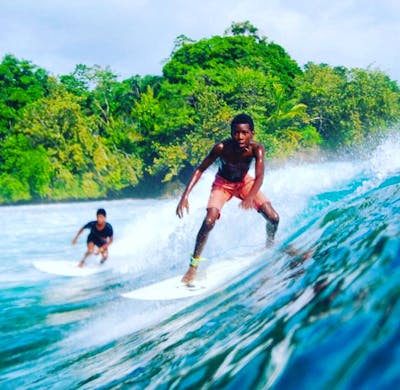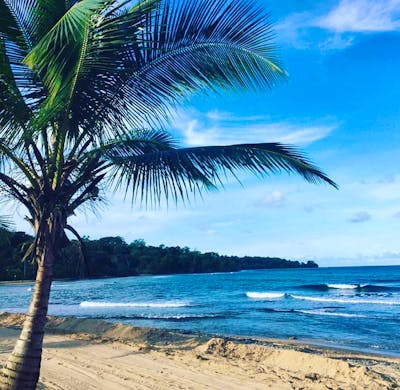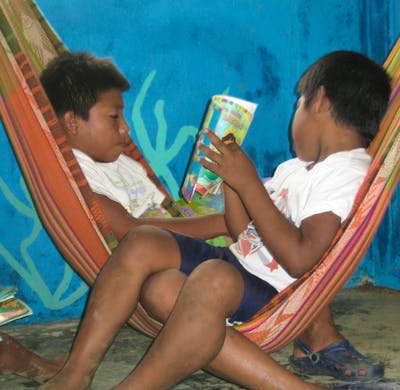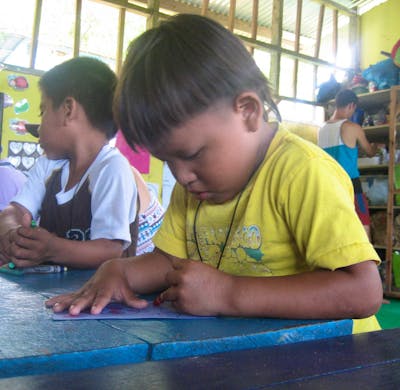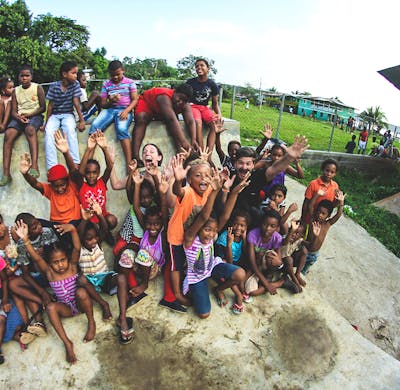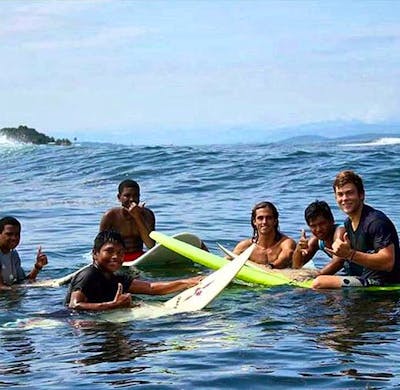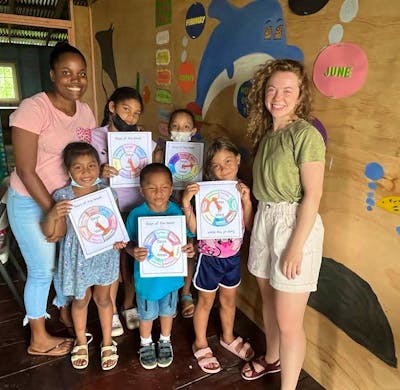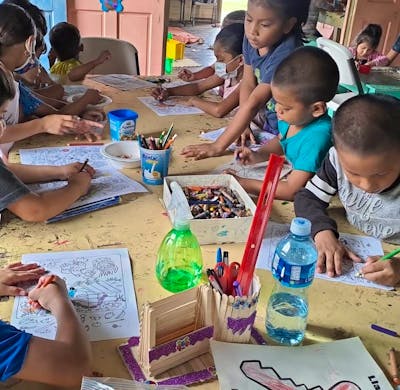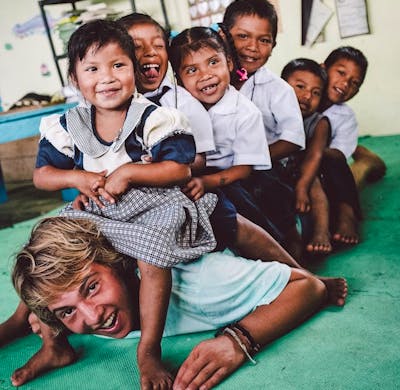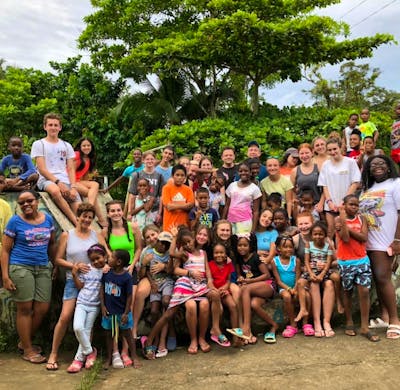About the Project
Since its inception in 2011, Give & Surf has strived to provide equal access to education for the indigenous communities of Bocas del Toro. Due to the isolated nature of some of these village communities, they have limited access to school and thus Give & Surf offers preschool, after-school, and summer camp programs to supplement the education provided by the public government. We now serve over 500 students weekly in our community centers and preschools in eight communities on five islands and continue to grow each year!
Volunteer Opportunities
Volunteers have the unique opportunity to be immersed in the local island communities and assist with our preschool and after-school programs. Week days typically consist of a half day of volunteering as an assistant teacher/instructor with one of our preschool or after-school programs and the remaining time is free to explore and enjoy the beautiful Bocas islands. Volunteers are encouraged to share their passions and talents and help plan activities for children to participate in including arts & crafts, sports, field trips, and more! Groups of volunteers are also welcome to come and often help with special projects such as the construction of a new playground or school.
Discover Boscas del Toro
Weekends and half of each weekday are free for volunteers to enjoy everything Bocas del Toro has to offer, including surfing, diving, hiking, biking, or just relaxing on the beautiful beaches! An option for volunteers is to experience Bocas del Toro by riding waves big or small. We wish to share our passion of surfing with you when you come to the islands. If surfing does not interest you. Don't worry there is a lot more to experience in Bocas del Toro. Many of our volunteers enjoy the region for its amazing beaches, hikes, and activities. If you are not an experienced surfer, no worries. We offer the opportunity to learn how to surf or surf world class waves when volunteering with us. One surf lesson is provided upon request to each volunteer. Volunteers are given the opportunity to surf during their free time and when the work schedule accommodates take trips to different surf breaks. We have a world of knowledge and years of experience in the ocean and Panama.
Do I need a visa? Any other entry requirements?
U.S. & Canadian citizens automatically receive a tourist visa for 180 days upon arrival in Panama. Your passport must be valid for at least 6 months
past your trip dates and you must show your exit ticket (flight ticket to leave Panama; a bus
ticket is not sufficient). For visa and entry requirements for other countries, please check with your country’s embassy
or consulate.
Health & Safety
Is it safe?
Yes, Panama City and Bocas del Toro are both safe areas to visit in Panama and Central
America, however you are in a developing country and thus should take general precautions.
The most frequent crimes are petty thefts and robberies, which can be avoided.
General
precautions include:
- Don’t carry a lot of cash or flash valuables around especially after dark.
- Stay in the tourist areas of Bocas and Panama City
- Use the buddy system or travel in groups.
- Don’t hike, swim, or surf by yourself
- Use reputable taxi and water taxi drivers and tour operators
- Say no to drugs. Drugs, including marijuana, are illegal in Panama.
All volunteers will go through a thorough orientation upon arrival which includes more
information about health & safety.
Do I need medical insurance? Yes. We strongly encourage all volunteers to have medical insurance coverage. We also
suggest all volunteers check their international coverage with their medical insurance providers
and/or buy travel medical insurance
What vaccinations do I need?
Please visit your primary health care physician to discuss your upcoming trip to Panama and to
get all of the necessary shots and medication required for your trip. You will want to have a
prescription from your doctor outlining all prescriptions and their purpose. You can also visit the
CDC’s website for a list of recommendations of vaccinations by country. In general, it is only
recommended that standard vaccinations (tetanus, hepatitis, etc.) are up to date for travel to
Bocas del Toro.
Can I drink the water?
Yes and no. We don’t recommend drinking the tap water in town or in the communities we work
as your body may not be accustomed to the bacteria in the local water. You can use the water to
brush your teeth, shower, etc. Most restaurants serve filtered water if you ask for a glass of
water and there is fresh filtered water provided at the Volunteer House.
What if I get hurt/ sick?
Bocas has a number of options for you. If you know what you need, there are many pharmacies
in town that carry antibiotics and other medicines that you can often buy without a prescription.
If you need to see a doctor you can:
Visit the local hospital’s Emergency Room that can take care of any medical emergencies.
Visit the local hospital which is very cheap but can take some time as it is normally very busy.
Visit the private doctor or clinic in town for $30-50 per consultation.
Do I need to speak Spanish?
It is not mandatory that our volunteers speak Spanish, but it will certainly help you while you are
here. English is widely spoken in Bocas but in the indigenous communities and with the kids it
helps to know a little bit of basic Spanish to communicate simple commands. The majority of our
volunteers speak little to no Spanish but we’re happy to teach you some basics and the kids will
too!
There’s a free app Duolingo that is a great way to start practicing your Spanish before you
arrive!
Do I need to have experience teaching or working with kids?
You do not need any previous experience working with kids. We will give you an orientation and
show you how you will need to be as a volunteer in the classroom/programs. We ask that you
bring a positive attitude and an open mind to each day of volunteering and everything else will
take care of itself!
Can I bring a friend?
Yes, we encourage you to share this experience with your friends and family!
Can I bring supplies or gifts for the children?
Yes! We always appreciate donated school supplies and activities for our preschools and
Community Centers. We can send you more specific needs before you come. Also feel free to
bring a special activity that you enjoy to do with the kids, such as an arts & crafts project, sports
activity, or board game you enjoyed as a kid! Please do NOT give children individual gifts.
When do I surf?
During our free time, a lot of volunteers will surf. We get all levels of surfers, from first timers to
advanced. This is an activity that we typically do when we are free in the mornings or late
afternoons and weekends. Transportation is provided to the main surf breaks on Carenero
Island when the Give & Surf boat is available. For those learning to surf one lesson is provided
per volunteer during their stay.
Surfing is best in December to April and mid-June to early August.
What if I am not a surfer or do not want to surf?
No problem! Many of our volunteers are not surfers and will find other activities more enjoyable
like hiking to the organic coffee & chocolate farm, snorkeling, SCUBA diving, hiking, biking, or
relaxing at the beach!
Where do I stay?
Most individual volunteers stay in shared rooms at our Volunteer House located on Bastimentos
Island. Our new Volunteer House is located in the heart of Old Bank (the main town on
Bastimentos Island) right next door to one of our community centers. The ocean-view house has
electricity, internet (limited), and running water and is just a 10-minute water taxi ride both from
Bocas Town and from some of the other communities where we work. There is a full kitchen,
including a stove and refrigerator, so you can store food and prep your meals.
If the Volunteer House is full, volunteers stay at one of our neighboring partner hotels or hostels.
If you prefer more private accommodations, we can make recommendations of nearby hotels
and B&Bs.
What do I need to bring?
A suggested packing list will be emailed to you before your arrival once you have paid your deposit.
What do I need to wear while teaching/volunteering?
While in the communities and at programs, we ask volunteers to wear t-shirts or short sleeve
shirts that cover their shoulders and longer style shorts. Comfortable, durable sandals or old
sneakers are recommended.
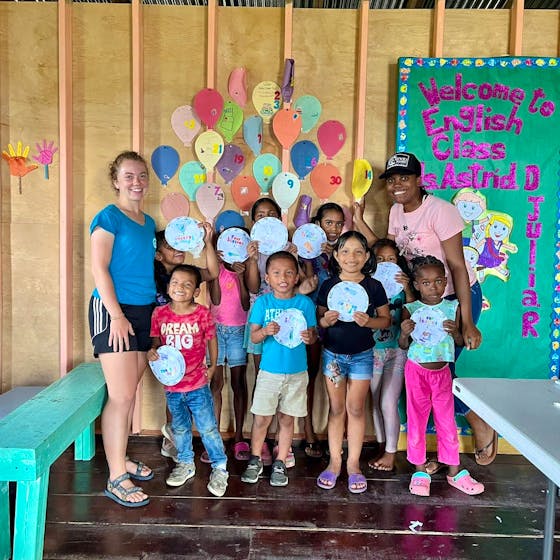
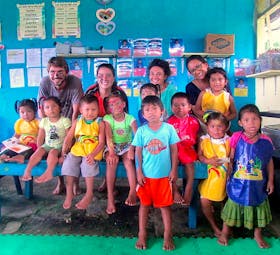
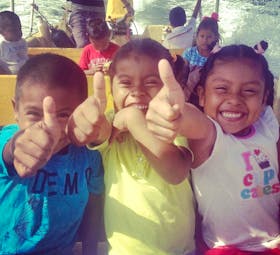
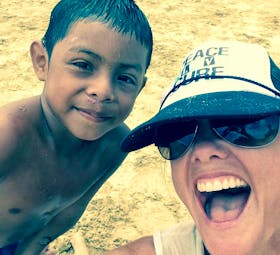
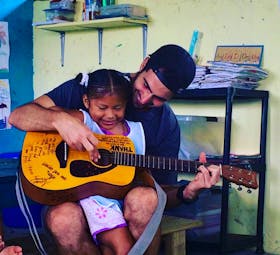
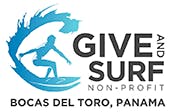
 4.4
4.4

